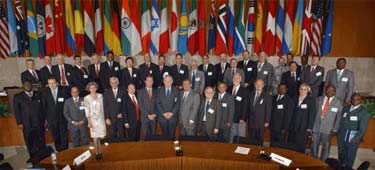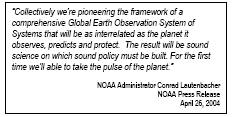Addressing Global Climate ChangeInternational Outreach and PartnershipsInternational Cooperation: The United States is engaged in extensive international efforts on climate, both through multilateral and bilateral activities. Multilaterally, the United States is by far the largest financial provider for the activities of the UN Framework Convention on Climate Change and the Intergovernmental Panel on Climate Change. The United States also leads R & D projects through the Generation IV International Forum, which is developing the next generation nuclear systems to produce electricity without emitting greenhouse gases. Bilaterally, the United States has developed a number of agreements with major international partners to pursue research on global climate change and deploy climate observation systems, collaborate on energy and sequestration technologies, and explore methodologies for monitoring and measuring GHG emissions. To date, new bilateral agreements have been established with countries representing over 70 percent of global greenhouse gas emissions: Australia, Japan, China, India, Italy, Canada, Russia, the Republic of Korea, New Zealand, Mexico, the European Union, Brazil, CONCAUSA, an organization of seven Central American countries, and South Africa. Earth Observation Summit: The first-ever Earth
Observation Summit was held July 31, 2003, to generate
strong, international support to link thousands of individual
technological assets into a coordinated, sustained, and
comprehensive global Earth observation system. The
purpose of the system is to provide the observations needed
to substantially improve our ability to identify and address
critical environmental, economic, and societal concerns. Throughout the world, individual systems
have already demonstrated their value, from
estimating crop yields to monitoring water and
air quality to improving airline safety. We have
limited knowledge, however, of how to address
concerns such as drought, disease outbreaks,
stronger agricultural production, and energy
and transportation challenges. The second Earth Observation Summit was held in Tokyo in April 2004. NOAA administrator Admiral Conrad Lautenbacher and EPA administrator Michael Leavitt both represented the United States. There are currently 48 international partners. Global Environmental Facility (GEF): The Bush Administration pledged $500 million to the GEF over the next four years (the largest contribution of any country, and almost a quarter of worldwide spending) to help developing countries address environmental problems, including global climate change. The GEF is the financial mechanism under the UN Framework Convention on Climate Change. This commitment, which will fund technology transfer and capacity building in developing countries, for environmental purposes, represents a 16 percent increase over the U.S. contribution in the previous replenishment. Tropical Forest Conservation and the Congo Basin Forest Partnership: In FY 2003, the Bush Administration directed $50 million for tropical forest conservation. These funds provide the resources needed to pursue additional “debt-for-nature” projects under the Tropical Forest Conservation Act and for the Congo Basin Forest Partnership launched by Secretary of State Powell and former EPA Administrator Whitman in September 2002 to preserve eleven key landscapes in Cameroon, the Central African Republic, the Democratic Republic of the Congo, Equatorial Guinea, Gabon, and the Republic of the Congo. On February 13, 2004, President Bush signed the Congo Basin Forest Partnership Act, authorizing appropriations to carry out the Congo Basin Forest Partnership (CBFP) program. |
~CONTENT~Home
Addressing Global Climate Change
A Cleaner, Healthier World Community
President Bush’s Performance-Based FY 2005 Budget ~DOCUMENTS~September 2004 |

- Afghanistan
- Africa
- Budget Management
- Defense
- Economy
- Education
- Energy
- Environment
- Global Diplomacy
- Health Care
- Homeland Security
- Immigration
- International Trade
- Iraq
- Judicial Nominations
- Middle East
- National Security
- Veterans
News
Interact
Your Government
- President's Cabinet
- USA Freedom Corps
- Faith-Based & Community Initiatives
- Office of Management and Budget
- National Security Council
- USA.gov
Appointments
|
Home >
News & Policies >
Policies in Focus
|


 International
cooperation can provide the tools needed to
address these scientific uncertainties. More
than 30 countries and 20 international organizations participated in the Summit. Participants adopted a Summit Declaration recognizing the
need to minimize data gaps and maximize the utility of the observations, and established an
intergovernmental group to develop the implementation plan.
International
cooperation can provide the tools needed to
address these scientific uncertainties. More
than 30 countries and 20 international organizations participated in the Summit. Participants adopted a Summit Declaration recognizing the
need to minimize data gaps and maximize the utility of the observations, and established an
intergovernmental group to develop the implementation plan.